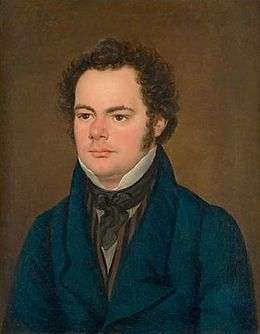Schwanengesang

 |
Der Atlas
Performed by Kammerchor Nikolasseee, Berlin (2:10) |
| Problems playing this file? See media help. | |
Schwanengesang ("Swan song"), D.957, is the title of a collection of songs written by Franz Schubert at the end of his life and published posthumously.
The collection was named by its first publisher Tobias Haslinger, presumably wishing to present it as Schubert's final musical testament to the world. Unlike the earlier Die schöne Müllerin and Winterreise, it contains settings of three poets, Ludwig Rellstab (1799–1860), Heinrich Heine (1797–1856) and Johann Gabriel Seidl (1804–1875). Schwanengesang was composed 1828 and published in 1829 just a few months after the composer's death on 19 November 1828.
In the original manuscript in Schubert's hand, the first 13 songs were copied in a single sitting, on consecutive manuscript pages, and in the standard performance order. All the song titles are by Schubert, as Heine did not give names to the poems. (Reed 259) Tobias Haslinger, Schubert's publisher, collected the songs together as a cycle, most possibly for financial reasons, as Die schöne Müllerin and Die Winterreise collections sold very well. Taubenpost is considered to be Schubert's last Lied.
Franz Liszt later transcribed these songs for solo piano.
Schubert also set to music a poem named Schwanengesang D744 by Johann Senn, unrelated to this collection.
An uncertain cycle
On 2 October 1828, Schubert (after the manuscript had been written) offered the Heine set of poems to a Leipzig publisher by the name of Probst. We can assume, then, that Schubert – at least in the beginning – intended to publish the sets separately. In addition to this, the order of Numbers 8–13 as they appear in the manuscript is different from that of the poems as Heine published them (No. 10 followed by 12, 11, 13, 9, 8).[1][2] It was customary for Schubert to respect the poet's sequence; the manuscript may not represent Schubert's desired order. The Seidl song, Die Taubenpost, has no connection to the rest of the cycle and was appended by Haslinger at the end to round up all of Schubert's last compositions.[2]
Content
.ogg.jpg)
The songs of Schwanengesang, as found in Schubert's manuscript:
- By Ludwig Rellstab:
- Liebesbotschaft ("Message of love"; the singer invites a stream to convey a message to his beloved)
- Kriegers Ahnung ("Warrior's foreboding"; a soldier encamped with his comrades sings of how he misses his beloved, and how he fears the prospect of dying, or losing his courage, in battle)
- Frühlingssehnsucht ("Longing in spring time": the singer is surrounded by natural beauty but feels melancholy and unsatisfied until his beloved can "free the spring in my breast")
- Ständchen ("Serenade"; the singer exhorts his lover to make him happy)
- Aufenthalt ("Resting place": the singer is consumed by anguish for reasons we aren't told, and likens his feelings to the river, forest and mountain around him)
- In der Ferne ("In the distance": the singer has fled his home, broken-hearted, and complains of having no friends and no home; he asks the breezes and sunbeams to convey his greetings to the one who broke his heart)
- Abschied ("Farewell": the singer bids a cheery but determined farewell to a town where he has been happy but which he must now leave)
- By Heinrich Heine:
- Der Atlas ("Atlas": the singer, having wished to experience either eternal happiness or eternal wretchedness, has the latter, and blames himself for the weight of sorrow, as heavy as the world, that he now bears, like the giant Atlas in classical mythology)
- Ihr Bild ("Her image": the singer tells his beloved of how he dreamed (daydreamed?) that a portrait of her favoured him with a smile and a tear; but alas, he has lost her)
- Das Fischermädchen ("The fisher-maiden": the singer tries to sweet-talk a fishing girl into a romantic encounter, drawing parallels between his heart and the sea)
- Die Stadt ("The city": the singer is in a boat rowing towards the city where he lost the one he loved; it comes foggily into view)
- Am Meer ("By the sea": the singer tells of how he and his beloved met in silence beside the sea, and she wept; since then he has been consumed with longing — she has poisoned him with her tears)
- Der Doppelgänger ("The double": the singer looks at the house where his beloved once lived, and is horrified to see someone standing outside it in torment — it is, or appears to be, none other than himself, aping his misery of long ago)
- The last song based on a poem written by Johann Gabriel Seidl:
- Taubenpost ("Pigeon post"; the song that is often considered the last Lied that Schubert ever wrote. The song is included into a cycle by the first editor and is almost always included in modern performances. In it, the singer declares that he has a carrier pigeon whose name is "Longing")
See also
References
External links
| German Wikisource has original text related to this article: |
- Schwanengesang songtexts and translations
- Schwanengesang: Scores at the International Music Score Library Project
- Performance of Schwanengesang by Randall Scarlata (baritone) and Benjamin Hochman (piano) from the Isabella Stewart Gardner Museum in MP3 format